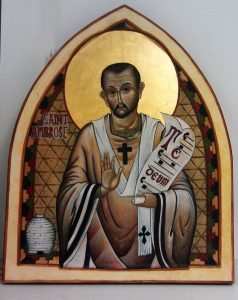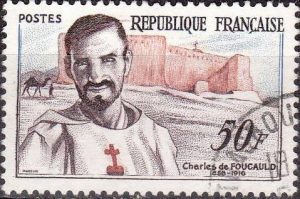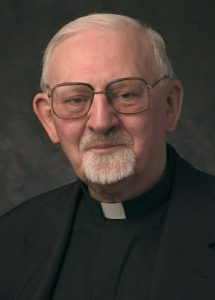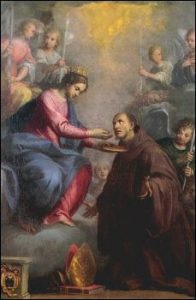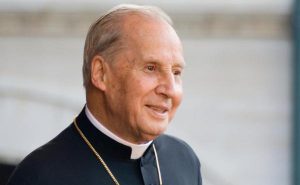 One key religious leaders of the Church died in Rome on December 12, 2016: Bishop Javier Echevarría (1932 – 2016). He was 22 years the leader of Opus Dei and was 84 years old. He died after a persistent lung infection.
One key religious leaders of the Church died in Rome on December 12, 2016: Bishop Javier Echevarría (1932 – 2016). He was 22 years the leader of Opus Dei and was 84 years old. He died after a persistent lung infection.
A brief biography:
Bishop Javier Echevarría was born in Madrid on June 14, 1932, the youngest of eight children. His attended a primary school of the Marianist Fathers in San Sebastian and continued his education in Madrid at a school run by the Marist Brothers.
In 1948, at a student residence, he met some young members of Opus Dei. Feeling that he was called by God to seek holiness in ordinary life, he asked to be admitted to Opus Dei on Sept. 8 of that year. He began studies in law at the University of Madrid and continued in Rome where he received a doctorate in canon law in 1953 at the Pontifical University of Saint Thomas (also known as the Angelicum), and a doctorate in civil law at the Pontifical Lateran University in 1955. Echevarria received priestly ordination on August 7, 1955. He worked closely with St. Josemaria Escriva and was his secretary from 1953 until the founder’s death in 1975.
In 1975, when Alvaro del Portillo succeeded St. Josemaria, Monsignor Echevarría was appointed secretary general of Opus Dei. In 1982 he was appointed vicar general.
After the death of Blessed Alvaro in 1994, Echevarria was elected prelate of Opus Dei, and on January 6 of the following year he was ordained bishop by St. John Paul II in St. Peter’s Basilica.
From the beginning of his ministry as prelate, his priorities were evangelization in the areas of the family, youth and culture. He oversaw the beginning of the Prelature’s stable formational activities in sixteen countries, including Russia, Kazakhstan, South Africa, Indonesia, and Sri Lanka. He traveled to all the continents to stimulate the evangelizing work carried out by the faithful and the cooperators of Opus Dei. He encouraged the founding of numerous institutions dedicated to immigrants, the sick and the marginalized, and he gave especial attention to a number of centers for the care of the terminally ill.
Recurring themes in his catechetical trips and in his pastoral ministry were the love of Jesus Christ on the cross, fraternal love, service to those around us, the importance of grace and the Word of God, family life, and union with the Pope. In his last pastoral letter, in fact, besides expressing thanks for the audience he had with Pope Francis on November 7, he asked—as always—that the members and friends of Opus Dei accompany the Pope with prayers for his person and intentions.
He wrote many pastoral letters and a number of books about spirituality, such as Itinerarios de vida cristiana (Paths of Christian Life), Para servir a la Iglesia (Serving the Church), Getsemaní (Gethsemane), Eucaristía y vida cristiana (The Eucharist and Christian Life), Vivir la Santa Misa (Living the Mass) y Creo, creemos (I Believe, We Believe). His last book is a collection of meditations about the works of mercy, which is entitled Misericordia y vida cotidiana (Mercy and Daily Life).
He was a member of the Congregation for the Causes of the Saints and of the Apostolic Signatura. He took part in Synods of Bishops in 2001, 2005, 2012 and in the Synods dedicated to the Americas (1997) and to Europe (1999).
Bishop Javier was waked at the Prelature in Rome and buried in the crypt of Our Lady of Peace, the Prelatic Church of Opus Dei (the headquarters) in Rome next to the remains of Blessed Alvaro del Portillo and in an area below the Church of the Prelature where the remains of St. Josemaria are under the altar. On Thursday December 15, a 7 pm, Mass was offered for the repose of the soul of Bishop Javier Echevarría in Saint Eugene’s Basilica.
Here is the homily given by Msgr. Fernando Ocáriz at the Mass on December 15 in Saint Eugene’s Basilica for the repose of the soul of Bishop Javier Echevarría.
It is good to note the telegram the Holy Father sent to Msgr. Fernando Ocáriz Braña Auxiliary Vicar of Opus Dei
Having just received the sad news of the unexpected death of Bishop Javier Echevarría Rodríguez, Prelate of Opus Dei, I wish to express to you and all the members of this Prelature my heartfelt condolences, while also uniting myself to your thanksgiving to God for his generous and fatherly testimony of priestly and episcopal life. He followed the example of Saint Josemaría Escrivá and Blessed Alvaro del Portillo, whom he succeeded at the head of this entire family, giving his life in a constant service of love to the Church and souls.
I raise up to our Lord fervent suffrages for this faithful servant of his so that He may welcome him to eternal joy, and I lovingly entrust him to the protection of our Mother, our Lady of Guadalupe, on whose feast day he surrendered his soul to God.
With these sentiments, and as a sign of faith and hope in the Risen Christ, I impart to all the consoling apostolic blessing.
The Vatican, 13 December 2016.
Francis

